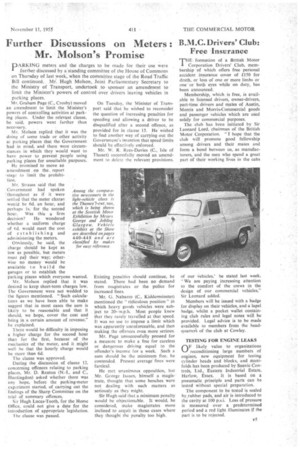Further Discussions on Meters : Mr. Molson's Promise
Page 119

If you've noticed an error in this article please click here to report it so we can fix it.
PARKING meters and the charges to he made for their use were .further discussed by a' standing committee of the Flouse'of Commons on Thursday of last week, when the committee stage of the Road Traffic
Bill continued.. Mr. Hugh Molson, Joint Parliamentary Secretary to the Ministry of Transport, undertook to sponsor an amendment to limit the Minister's powers of control over drivers leaving vehicles in parking places.
Mr. Graham Page (C., Crosby) moved an amendment to limit the Minister's powers of controlling activities at parking places. Under the relevant clause, he said, powers went farther than necessary. .
Mr. Molson replied that it was the doing of some trade or other activity at parking places that the Government had in mind, and there were circumstances in which they would want to have power to prevent people using parking places for unsuitable purposes.
He promised to move an amendment . on the, report --stage to limit the prohibition.
Mr. Strauss said that the Government had spoken 'throughout as if it were settled that the meter charge would be 6d. an hour, and perhaps Is. for the second hour. Was this a firm decision? He wondered whether a uniform charge of 6d. would meet the cost of establishing and administering the meters.
Obviously, he said,. the charge should be kept as low as possible, but meters must pa!, their way; otherWise no money would• be available to build the garages or to establish the parking places which everyone wanted.
Mr. Molson replied that it was desired to keep short-term charges low. The Government were not wedded to the figures mentioned. "Such calculations as we have been able to make suggest that in most cases the sum is likely to be reasonable and that it should, we hope, cover the cost and bring in a certain amount of revenue," he explained.
There would be difficulty in imposing a higher charge for the second hour than for the first, because of the mechanics of the meter, and it might well be that the hourly charge would be more than 6d.
The clause was approved.
During the discussion of clause 12, concerning offences relating to parking places, Mr. D. Renton (N.-L. and C., Huntingdon) asked whether there was any hope, before the parking-meter experiment started, of carrying out the findings of the Sharp Committee on the trial of summary offences.
Sir Hugh Lucas-Tooth, for the Home Office, could not give a date for the introduction of appropriate legislation.
The clause was passed.
On Tuesday, the Minister of Transport said that he wished to reconsider the question of increasing penalties for speeding and allowing a driver to be disqualified after a second offence, as provided for in clause 15. He wished to find another way of carrying out the Government's intention that speed limits should be effectively enforced.
Mr. W. R. Rees-Davies (C., Isle of Thanet) successfully moved an amendment to delete the relevant provisions.
Existing penalties should continue, he stated. There had been no demand from magistrates or the police for increased fines.
Mr. G. Nabarro (C., Kidderminster) mentioned the "ridiculous position" in which heavy goods vehicles were subject to 20m.p.h. Most people knew that they rarely travelled at that speed. It was no use to impose a limit which was apparently unenforceable, and then making the offences even more serious.
Mr. Page unsuccessfully pressed for a measure to make a fine for careless or dangerous driving equal to the offender's income for a week. Such a sum should be the minimum fine, he contended. Present average fines were farcical.
He met unanimous opposition, but Mr. George Isaacs, himself a magistrate, thought that some benches were not dealing with such matters as seriously as they might.
Sir Hugh said that a minimum penalty would be objectionable. It would, he considered, make magistrates more inclined to acquit in those cases where they thought the penalty too high.
































































































































































































































































































